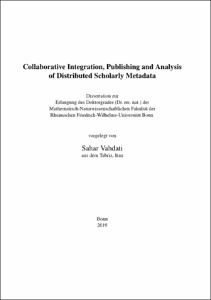Vahdati, Sahar: Collaborative Integration, Publishing and Analysis of Distributed Scholarly Metadata. - Bonn, 2019. - Dissertation, Rheinische Friedrich-Wilhelms-Universität Bonn.
Online-Ausgabe in bonndoc: https://nbn-resolving.org/urn:nbn:de:hbz:5n-53638
Online-Ausgabe in bonndoc: https://nbn-resolving.org/urn:nbn:de:hbz:5n-53638
@phdthesis{handle:20.500.11811/7874,
urn: https://nbn-resolving.org/urn:nbn:de:hbz:5n-53638,
author = {{Sahar Vahdati}},
title = {Collaborative Integration, Publishing and Analysis of Distributed Scholarly Metadata},
school = {Rheinische Friedrich-Wilhelms-Universität Bonn},
year = 2019,
month = feb,
note = {Research is becoming increasingly digital, interdisciplinary, and data-driven and affects different environments in addition to academia, such as industry, and government. Research output representation, publication, mining, analysis, and visualization are taken to a new level, driven by the increased use of Web standards and digital scholarly communication initiatives. The number of scientific publications produced by new players and the increasing digital availability of scholarly artifacts, and associated metadata are other drivers of the substantial growth in scholarly communication. The heterogeneity of scholarly artifacts and their metadata spread over different Web data sources poses a major challenge for researchers with regard to search, retrieval and exploration. For example, it has become difficult to keep track of relevant scientific results, to stay up-to-date with new scientific events and running projects, as well as to find potential future collaborators. Thus, assisting researchers with a broader integration, management, and analysis of scholarly metadata can lead to new opportunities in research and to new ways of conducting research. The data integration problem has been extensively addressed by communities in the Database, Artificial Intelligence and Semantic Web fields. However, a share of the interoperability issues are domain specific and new challenges with regard to schema, structure, or domain, arise in the context of scholarly metadata integration. Thus, a method is needed to support scientific communities to integrate and manage heterogeneous scholarly metadata in order to derive insightful analysis (e.g., quality assessment of scholarly artifacts).
This thesis tackles the problem of scholarly metadata integration and develops a life cycle methodology to facilitate the integrated use of different methods, analysis techniques, and tools for improving scholarly communication. Some key steps of the metadata life cycle are implemented using a collaborative platform, which allows to keep the research communities in the loop. In particular, the use of collaborative methods is beneficial for the acquisition, integration, curation and utilization of scholarly metadata. We conducted empirical evaluations to assess the effectiveness and efficiency of the proposed approach. Our metadata transformation from legacy resources achieves reasonable performance and results in better metadata maintainability. The interlinking of metadata enhances the coherence of scholarly information spaces both qualitatively and quantitatively. Our metadata analysis techniques provide a precise quality assessment of scholarly artifacts, taking into account the perspectives of multiple stakeholders, while maintaining compatibility with existing ranking systems. These empirical evaluations and the concrete applications with a particular focus on collaborative aspects demonstrate the benefits of integrating distributed scholarly metadata.},
url = {https://hdl.handle.net/20.500.11811/7874}
}
urn: https://nbn-resolving.org/urn:nbn:de:hbz:5n-53638,
author = {{Sahar Vahdati}},
title = {Collaborative Integration, Publishing and Analysis of Distributed Scholarly Metadata},
school = {Rheinische Friedrich-Wilhelms-Universität Bonn},
year = 2019,
month = feb,
note = {Research is becoming increasingly digital, interdisciplinary, and data-driven and affects different environments in addition to academia, such as industry, and government. Research output representation, publication, mining, analysis, and visualization are taken to a new level, driven by the increased use of Web standards and digital scholarly communication initiatives. The number of scientific publications produced by new players and the increasing digital availability of scholarly artifacts, and associated metadata are other drivers of the substantial growth in scholarly communication. The heterogeneity of scholarly artifacts and their metadata spread over different Web data sources poses a major challenge for researchers with regard to search, retrieval and exploration. For example, it has become difficult to keep track of relevant scientific results, to stay up-to-date with new scientific events and running projects, as well as to find potential future collaborators. Thus, assisting researchers with a broader integration, management, and analysis of scholarly metadata can lead to new opportunities in research and to new ways of conducting research. The data integration problem has been extensively addressed by communities in the Database, Artificial Intelligence and Semantic Web fields. However, a share of the interoperability issues are domain specific and new challenges with regard to schema, structure, or domain, arise in the context of scholarly metadata integration. Thus, a method is needed to support scientific communities to integrate and manage heterogeneous scholarly metadata in order to derive insightful analysis (e.g., quality assessment of scholarly artifacts).
This thesis tackles the problem of scholarly metadata integration and develops a life cycle methodology to facilitate the integrated use of different methods, analysis techniques, and tools for improving scholarly communication. Some key steps of the metadata life cycle are implemented using a collaborative platform, which allows to keep the research communities in the loop. In particular, the use of collaborative methods is beneficial for the acquisition, integration, curation and utilization of scholarly metadata. We conducted empirical evaluations to assess the effectiveness and efficiency of the proposed approach. Our metadata transformation from legacy resources achieves reasonable performance and results in better metadata maintainability. The interlinking of metadata enhances the coherence of scholarly information spaces both qualitatively and quantitatively. Our metadata analysis techniques provide a precise quality assessment of scholarly artifacts, taking into account the perspectives of multiple stakeholders, while maintaining compatibility with existing ranking systems. These empirical evaluations and the concrete applications with a particular focus on collaborative aspects demonstrate the benefits of integrating distributed scholarly metadata.},
url = {https://hdl.handle.net/20.500.11811/7874}
}






